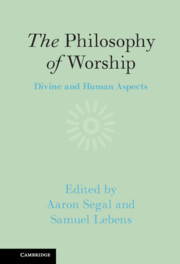Book contents
- The Philosophy of Worship
- The Philosophy of Worship
- Copyright page
- Contents
- Contributors
- Part I Two Introductions
- Part II What Is Worship?
- Part III Normative Aspects
- Part IV Forms and Functions of Worship
- 13 Liturgical Philosophy of Religion
- 14 Maimonides on Worship, True and False
- 15 The Individual’s Relationship with God
- 16 The Metaphysics of Divine Presence and the Appropriateness of Worship
- Index
- References
16 - The Metaphysics of Divine Presence and the Appropriateness of Worship
from Part IV - Forms and Functions of Worship
Published online by Cambridge University Press: 09 January 2025
- The Philosophy of Worship
- The Philosophy of Worship
- Copyright page
- Contents
- Contributors
- Part I Two Introductions
- Part II What Is Worship?
- Part III Normative Aspects
- Part IV Forms and Functions of Worship
- 13 Liturgical Philosophy of Religion
- 14 Maimonides on Worship, True and False
- 15 The Individual’s Relationship with God
- 16 The Metaphysics of Divine Presence and the Appropriateness of Worship
- Index
- References
Summary
Acts of worship typically involve expressions of fealty: One takes off one’s shoes, bows low, or falls on one’s face. Experiences that naturally prompt such expressions – the sense that one is in the presence of God in an unusual and profound way – raise interesting metaphysical questions about divine presence and absence. Talk of special divine presence poses serious puzzles. In the Jewish scriptures – and in the writings and words of those who treat these scriptures with reverence, whatever their religion – there is much talk of God’s presence and of God’s absence. And yet, God is also affirmed to be everywhere. How can God be everywhere, but also absent from some places, and especially present in others? Metaphysics is a likely place to look for a range of possible answers to this simple but puzzling question.
- Type
- Chapter
- Information
- The Philosophy of WorshipDivine and Human Aspects, pp. 296 - 326Publisher: Cambridge University PressPrint publication year: 2025

